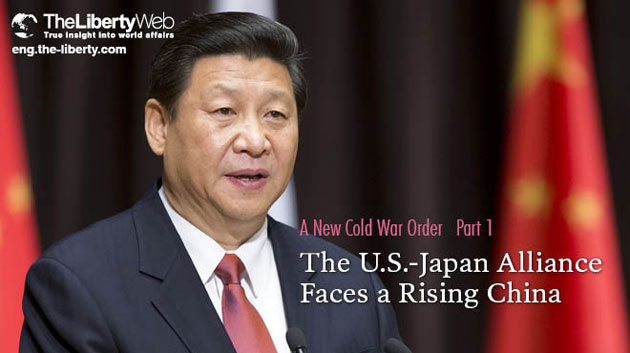A New Cold War Order: The U.S.-Japan Alliance Faces a Rising China
The Cold War between the U.S.-Japan alliance and China has silently begun. 57 countries, excluding Japan and the U.S., have become members of the Asian Infrastructure Investment Bank (AIIB) led by China.
Despite America having announced its intention to not join, many European countries such as the U.K. joined, thus signifying America’s waning influence. Will China led by Xi Jinping become, by the end of his term in 2023, the new superpower in place of the U.S.?
Introduction To China’s Rise
“We are about to embark on the establishment of a new civilization, namely the ‘Great Chinese Empire’. Western civilization is coming to an end.”
Such were the words spoken by the guardian spirit of Xi Jinping in 2010, the year when he was appointed the leader of China. This was in a spiritual message conducted by Master Ryuho Okawa of Happy Science. The message uncovered his vast ambitions in contrast to his public image as a being ‘pro-Japanese’ and a ‘managerial leader’.
Five years since, this ambition has steadily come to take shape.
After he was appointed President in 2013, many conflicts arose, such as the Senkaku Islands, anti-Japan riots, disputes in the South China Sea to name a few. This year, China built a 3000m runway on the Spratly Islands in the South China Sea, which could potentially land military aircraft. In addition, the AIIB, led by China, has announced its seemingly innocuous purpose of advancing infrastructure investment in the Asia, thus establishing an image of a generous superpower.
China, A Generous Superpower?
When looking on a map of the developing countries that China has been ‘supporting’, it can be seen that this ‘support’ spans the entire globe.
In November last year, Xi Jinping announced at APEC, held in Beijing, that the Chinese economy would bring enormous profits to the Asia-Pacific economy. At the Asian-African Conference held in April this year, he once again announced that he would urge developed nations to fulfill their promise of aid. By supporting developing countries, China has established themselves as a generous superpower that leads the world.
China is indeed delivering large-scale financial aid and investment that extends throughout Africa, South and Central America, and the Asia-Pacific.
Culturally, China has established the Confucius Institute in 475 locations in 126 countries to promote the Chinese language. China has also dispatched hospital ships to islands in the south pacific to provide medical services, and in Myanmar former soldiers of the People’s Liberation Army have been aiding the independence movement of the Kokang people. Thus, China has been providing support in many fields.
Autocratic Nations Are Grateful For China
Usually, a developed country supporting a developing country would abide by the regulations of the Organisation for Economic Co-operation and Development (OECD). In order to encourage the independence of developing countries, there are limitations posed on potential support, such as those that require autocratic nations to adopt democracy before receiving support. China, however, is not involved with the OECD, and as soon as a bilateral agreement is reached, the support begins. Therefore, developing nations that are autocratic are grateful for China.
The funding for these large investments partially come from large businesses. This is because unlike in capitalist countries, many, even privte, businesses in China are arms of the Chinese government. In other words, as long as these businesses advance China’s foreign policy, they are able to do their business without worrying about profitability or costs.
China has also spread its influence in Europe. For instance, they are providing support to Greece amidst Europe’s economic crisis.



















